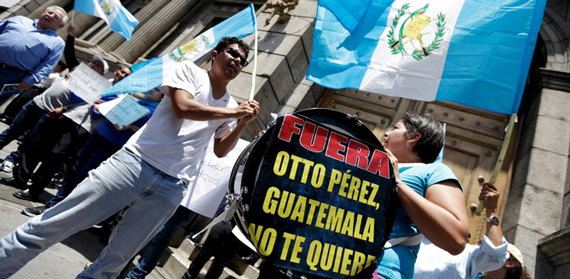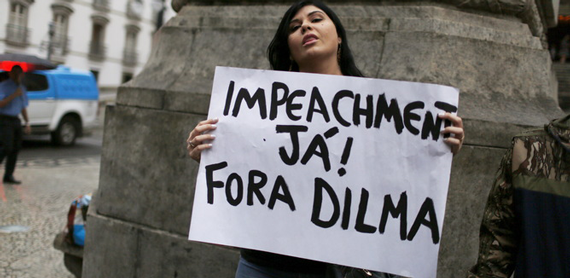Guatemalans demand the prosecution of their now-ex-president, Otto Pérez. Reuters/Jorge Lopez
Guest post by Neil Pyper
Much has changed in Latin America over the past 15 to 20 years, but corruption is as serious a challenge as ever – in all its ugly forms.
Patience among the people, however, is running out. Corruption investigations in Guatemala and Honduras, for example, have sparked massive protests. In the Guatemalan case, they led to the resignation and subsequent arrest of the president and vice president. A presidential run-off on October 25 delivered a victory for Jimmy Morales, a comedian and political outsider who campaigned on an anti-graft platform.
The escape of Mexican drug kingpin Joaquín “El Chapo” Guzmán from a maximum-security prison put corruption among jail authorities under the spotlight. It raised the uncomfortable prospect that the graft that allowed him to flee through a carefully dug tunnel pervaded the political and judicial systems even more extensively than previously had been imagined.
There’s trouble further south, too. In Peru, assorted allegations of impropriety against both the president and first lady have dominated public life for months.
There have also been protests against corruption in Brazil, which is currently in a significant economic downturn.
Brazils’ president, Dilma Rousseff, and vice-president, Michel Temer, stand accused of receiving donations from construction companies that used illicit means to win contracts from state-controlled oil company Petrobras. The president appears safe for now, and may yet manage to fully exculpate herself, but the Brazilian public’s anger shows no sign of abating.
These scandals are all testament to a frustrating reality: across Latin America, corruption has proved remarkably resilient to economic, political and social development.
Some things never change
While Peru has reaped the most stunning rewards of a major commodities boom, high natural resource prices and strong demand, especially from China, have kick-started economies across the region. Governments have pumped money into their welfare budgets, which has reduced inequality dramatically.
Even more fundamentally, and notwithstanding recent events in Venezuela and the persistence of the Castros in Cuba, democracy at last seems to have taken root in places where it has long struggled. Across Central and South America, new democracies are finally coming into their own, repairing the damage done by the military dictatorships of the 1970s and 1980s and the authoritarian and/or dubious governments of the 1990s.
But the news is only so good. While the widespread international criticism of a coup in Honduras in 2009 showed how far Latin America had come in its transition to democracy, the region’s democratically elected governments seem unable or unwilling to tackle the problem of corruption – and, in many cases, they’re still part of the problem.
Popular fury in Brazil. Reuters/Pilar Olivares
Indeed, the commodities boom may well be driving corruption in much of the region and providing a degree of impunity for scurrilous participants. The corruption that pervades the Peruvian political system, for example, looks like a classic case of resource curse, with a self-serving political elite possibly squandering revenues from booming natural resource exports.
In the Peruvian case, the elite has not appropriated all of these resources. There has also been a boom in construction and consumer spending, at least in Lima and a few other major cities. There is a longstanding view that economic prosperity makes people more tolerant of corruption – and while there’s plenty of scrutiny of the scandals that unfold in Peru, the relative lack of public outrage seems to support this view.
In contrast to Peru, the corruption scandal in Brazil is playing out amid an increasingly tough economic recession, which is helping to stoke the public’s anger. Guatemala and Honduras are similar. The economies of both countries have picked up over recent years. Nonetheless, political and corporate elites historically have been much less willing to share the benefits of periods of economic strength.
Guatemala’s tipping point
At the same time, there is a longstanding tradition of political elites acting with impunity. This is despite bodies such as the UN anti-corruption commission in Guatemala, which have aimed to tackle this in recent years.
These factors have led to an apparent tipping point being reached. Civil society and large sections of the wider electorate seem no longer to be willing to tolerate political elites engaging in widespread misappropriation of wealth. However, there will be much to do if their anger is to lead to meaningful change, making public life more transparent.
Guatemala’s incoming president has made significant promises. He is likely to struggle to deliver on these in the face of a political establishment seeking to defend its interests. At the same, his affairs are facing increasing scrutiny. He could yet have problems because of associations with former military officers implicated in graft and human rights abuses.
The other all-too-pervasive influence is drug trafficking. There have been few signs of drug cartels and related organised crime gangs capturing politics at a national level, but there’s plenty of evidence that they still dominate regional politics in parts of Mexico, Peru and Central America.
And while they may not be in full control, cartels do seem to still exert some influence in national politics. This was seen when former Peruvian president, Alan García, pardoned figures with alleged links to drug trafficking.
As El Chapo’s escape shows, many large cartels operate with substantial impunity. They are also perfectly capable of co-opting corporate elites, as was made plain by the recent closure of the Honduran bank Banco Continental after American allegations that it was involved in laundering drug money.
So long as the dominance of these groups goes unchallenged, there is little prospect of Latin America’s radically improved democracies stamping out corruption for good. National governments have shown themselves largely unable to address the problem – and it seems there’s no other force powerful enough to step in.
Originally written for ‘the Conversation’





Comments are disabled